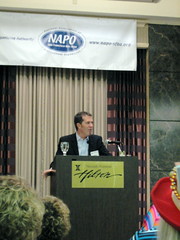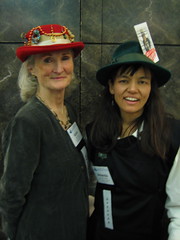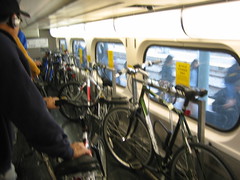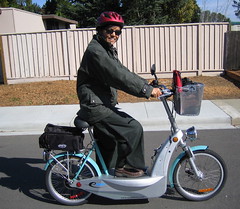Getting There From Here
During the weekend of the Green Festival, the most compelling message for sustainable living came from another conference altogether, far from the glamour of organic hemp socks, electric bicycles and biodiesel co-ops. And despite the free giveaway vinyl bag, it was also a far less paper intensive, free samples event. It was our own West Coast Regional Conference for professional organizers held across the bay in Newark.
Peter Walsh, from Clean Sweep, one of the many cable TV shows about redoing your home, was our keynote speaker.
"It's not about the stuff," he told the two hundred women and five men in attendance. He had put his finger on what we already knew as organizers. Stuff, organizing it, purging it, staging it, might be our service, but the underlying theme was finding out how people see themselves. Who they are, what do they want from life and how can we help them achieve it?
An Australian by birth, Peter, took a stand on over consumption. He commented on how people limit their definition of themselves with their stuff. "This is my collection," he said mocking his clients and then gestured barfing on the floor. "My scrap booking" (again the gesture). We laughed. He was daring to make a judgment on The Stuff. He told us he foresaw a day when over consumption would become as socially unacceptable as smoking.
Yes, I thought, having worked on anti-smoking campaigns in my past, this might well be the path of our journey from the material world. When life-threatening facts did not motivate smokers to quit, pressure from society did. The unglamourizing of smoking was a key part of the anti-smoking campaign. Thus the uglification of excess may do the same to lighten our impact on the earth. Hummers, for instance. Who can honestly defend them? "Oh, but I need the tax cut." Really? Get real.
His commentary on consumption, set the stage for my own presentation with my colleague Karla Jones in a break-out session called Simplifying Lives: Talking to Clients About Consumerism. We drew over thirty people, including Peter himself. Clearly a compelling topic, but did we have answers? We used case study examples which served mainly to show how deeply people had dug themselves into their material habits. The Book Buying Lady, for instance. Karla persuaded this client to give away what amounted to 25 bags of books, leaving more behind that she had not yet read.
Then there was the Gift Lady who had attracted the attention of the fire marshal with her collection of gifts filling up her tiny apartment. Gifts given to her that she couldn't use and gifts that she had on hand to give others at those many office birthday and holiday parties. A nation of anxious office wallflowers caught in a chronic gift-giving crisis. "Will I have the right gift?" No wonder we had no time to think of bigger things.
Our audience contributed examples of clients who had sports equipment for every conceivable sport. We brainstormed ways we could raise our client's consciousness with questions about their reading habits, their leisure habits, their actual needs, their fears, their wish to be good at something. We give them permission to get rid of stuff, set boundaries, help them to define their passions. Karla asked her book-buying client to imagine an alarm going off as she entered a bookstore, loudly warning her not to buy anything.
But could we question the whole paradigm of stuff itself? We can collaborate with the client's own desire for relief, make suggestions about organizing the stuff, persuade them that less is more, but we do not question the choice to own things in the first place. We had clients, and relatives too, who dutifully keep up with every new trend and technology. Our only job was to cart away yesterday's hot item. It was not our place to question this ongoing consumerism.
But we could set an example. I joked that my arriving at my client's house in an electric car was a way of driving my point home. The point being that you don't have to have a two ton, gas consuming box on wheels to get where you need to go. It was, however, still about a thing. An adorable, head turning thing, for sure, but it was still about my defining myself with a thing. That's Amanda's thing they could say.
It was not until I arrived at a client's house on a bicycle that a new message was given. You mean it's possible to function on a public street without getting inside a personal mobile environment, an armchair-comfy, stereophonically wired, hot beverage-cup-holding, phone booth and footlocker for all my stuff. My home away from home. My living room. Can this be safe? What about when it rains? You are crazy aren't you?
When the Sparrow was taken away for six months (still not back yet), I couldn't bear to go back to polluting. I already rode my bike within my own city limits doing errands, maybe I could go further. I had two clients in Menlo Park, so I just went for it. Nine miles round trip and only fifteen minutes more than if I drove. Worth an evening at the gym (if I were to go to a gym). My first client to have me arrive by bike looked at me with new respect.
"You are something," she said. She knew how far I had ridden (though it wasn't far really in cyclist terms). She herself lived closer to her office than I did by half the distance. She could visualize biking to work now, but would it fit her identity? That's how we think. I'm a doctor I can't show up on a bicycle. I'm a Republican, I have to vote for Bush, I'm a flush toilet person do or die.
I was exhilarated by that ride. For one thing it took me through the priciest real estate on the peninsula, a veritable showcase of homes on pleasant tree lined streets. And at the end of the fine homes tour I might catch a glimpse of a polo match, horses thundering across the field for God's sakes, at a tony club hidden from view of cross town traffic. People didn't know what they were missing.
Careful plotting with a map was required for there is only one way through the maze of dead end streets all the way from San Carlos. And for that reason there was little traffic. By the end of that ride, I felt like I had been on a vacation and I was all pumped up, ready for a bout of sorting and organizing. It made me realize how deadening driving actually is, how passive to be stuck in traffic, frustrating when I've overshot my turn on a new route and stressful to be late.
When an ongoing client who lived in the city, summoned me, I decided to take the train with my bike. Parking in her building required running into the lobby to get a parking pass from the concierge, then driving around the block again to enter the garage, then walking from the bottom of the parking garage, taking two different elevators and going through two security doors. Then they took away the parking passes. People had been abusing the privilege, the concierge told me. The nearest parking garage was $6 per half hour. On street parking was limited to 2-hour meters. Biking in would save me substantially in parking, hassle and time.
I remembered that I had once had a yen to be a bike messenger. I strapped my label maker gear bag to my rear carrier and headed out. At the first hill I heard the thunk of the bag falling off the carrier. I almost returned home to rethink my adventure, but strapped it back on tighter.
There's a special car for bikes on the train. You bungee your bike onto a rack on top of other bikes that might already be there. This requires some cooperation with others and there was a good deal of comradery among bike commuters. (One even asked if he could borrow my cell phone to check his messages). And they were not your black spandex shorts crowd. Nor did they ride $7,000 mountain bikes. Theirs were scrappy, thrasher bikes. These cyclists were more likely to ride with critical mass, the bike protest event now happening the last Friday of every month in cities worldwide. I enjoy the train. You can't nap while driving, or read or do paperwork unless you arrive early and park. Plus I get lost a lot, driving.
The route I chose from my city bike map was posted with a road sign stating that bicycles had the full use of a lane. Wow, equal footing with cars. But was it safe? It was certainly easier to see everything. I felt released from the visually impaired experience of driving amidst high rises and not being able to see up, feeling trapped and ambushed by double-parked delivery trucks, hand carts, cars emerging from driveways, aggressive pedestrians. On a bike, I could see them all. I could be in the lane, but I could also slip between cars that were stopped or get on the sidewalk if things got hairy. I followed the lead of other cyclists.
A couple of miles and I was there. How easy it was to take my bike right into the lobby of my clients building, up the two elevators and roll it into her hallway where her own bike was parked. Being a cyclist herself, I could tell she was impressed that I had actually arrived by bike. She confessed, later, that she had considered riding to work, but the route would have taken her through Hunter's Point, a dicey area of town. Hmmm. I wondered if she had considered the train connection.
It has been said that efforts to live a more ecologically modest life are sometimes at odds with efforts to simplify one's life. This may be one of those times. You would think that having a different destination every day as a traveling professional organizer was complicated enough without adding to the mix a diversified portfolio of transportation options, each with their own outfits, accessories and means of carrying gear. I had, by the end of the summer, regularly used five different vehicles including my kick scooter and a new addition, the eGo Cycle, my two wheeled electric scooter for hill climbing that I bought to fill the vacuum left by the Sparrow.
If we could travel into the future and see what havoc our consumption was bringing to our planet in the form of resource depletion, habitat destruction and global warming, we would be so sickened by the consequences of our impact that we would be physically unable to get into our cars. (Driving has the highest impact of anything we do.) But we have no such experience, no memory to inform us. We can hold at arms length the news of rising sea levels, changing patterns of bird migration, breaking ice packs. It's not real to us. We have to want to see it.
Julia Butterfly Hill gave environmentalists grief for using paper cups at the gatherings where she would be speaking. Having spent two years sitting in the old growth tree she called Luna, to save it from loggers, she couldn't look at a paper cup without seeing felled trees. This was real to her. Recently, in Menlo Park, the closing of Keplers, the last independent bookstore in these parts, brought home to locals the consequences of buying books online. Hundreds turned out to save Keplers, the doors were open again and we have been given a second chance. Are we going to continue to buy books from Amazon? Not likely, remembering what we nearly lost.
I am not the first wave of activists to consider lifestyle changes, nor am I the second wave, maybe not even the third. But I could be a bridge to the next.
Also posted at energy bulletin








3 Comments:
oo-wow.
I LOVE personal stories that connnect to the bigger picture!
Thank you for being you!
christania’s “rent family bike” bikes are rolling across the city. The system, less than a year old, is funded by christania’s municipal government. It is currently only in one of christania’s 22 administrative districts. Although a 2nd generation system, there are 12 “Houses” in this district, each with around 40 bikes. The yearly subscription cost is the equivalent of $2 US, and allows the use of a bike for up to four hours at a time. In less than a year, there have been 6,000 subscriptions sold. There are larger 3rd generation systems in the world, which do not have a subscription to bike ratio as big as that.
Hi nice reading your bloog
Post a Comment
<< Home